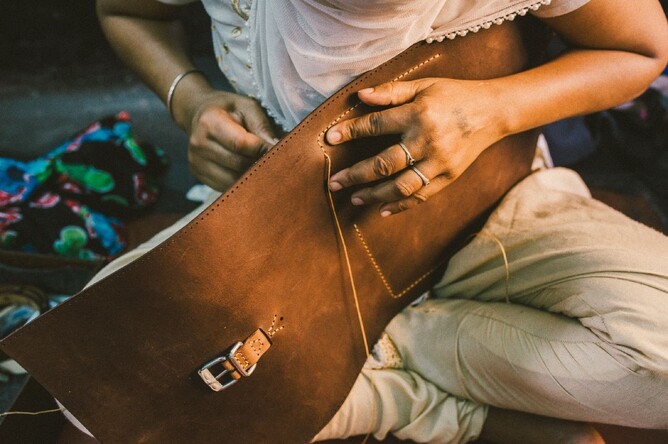Lou and her family are Kiwi’s who spent two years with the team at The Loyal Workshop. Below is a reflection Lou wrote shortly before leaving South Asia.
It is 9am and I’m sitting in the office of the workshop, tucked away in the lanes of Bowbazar. It is humid today, with monsoon rains likely to fall later. The damp air holds the scents of cooking spices, jasmine flower garlands used for prayer rituals, and the smell of cheap spirits distilled next door. Through the window’s open shutters I can see people walking past. A general store sells daily groceries through an opening a couple of meters across the lane. A woman and young child are feeding meat scraps to eight cats in the narrow alley between buildings. There is a man bathing at the tap in the lane, which the only water source for most of the surrounding buildings. Around the corner is a tea stall where people perch on wooden benches or stand to chat and sip the sweet, milky drink. As the day goes on, women will wash their dishes and clothes at the tap, groups of men will sit together to play cards close by, and children will start games of cricket in the alley.
A little further up the lane, some women bring plastic chairs outside to sit on. Their clothes, their makeup, and their posture suggests to me that they are working in the adjacent red light area. I greet the familiar women that I pass as I arrive at and leave from work each day, and they return my smile and greeting. These looks often hold much warmth.
I am the first one here in the morning, but over the next hour the artisans arrive at work with a cheerful, “Good morning! Nomoskar! Bhalo acho?” One woman comes into the office each morning and gives my shoulder a friendly squeeze. In Bangla, she asks me, “How are you? How are the children? How is Andy?” My conversational language is limited, so following my responses she smiles graciously and heads upstairs to the workrooms. Another woman isn’t too concerned about how much I understand, as she launches into an explanation about something that happened the day before. I think I’m following OK, though I can’t be certain. My nods and expressions of sympathy are received well anyway.
At 10am we gather together in one of the upstairs rooms for a devotional time. Knee-to-knee, we all sit cross-legged on the painted concrete floor beneath the spinning ceiling fan, raising our voices in Jishu gan together. This family time of singing, sharing and praying is a daily practice in the workshop, and my favourite time of the day.
I look around the room at all these faces that were once strangers. I arrived here as an affluent foreigner and they were the poor and marginalised. We have always had a barrier of language as I’ve struggled along with my very basic Bangla. However, these are now people I have laughed with, usually over the silliest things, and people I have mourned with over tragic losses. In this workroom I have cried hot tears of hurt and humiliation, and I have been shown kindness, compassion and understanding. I have visited many of their single-room homes and hosted them in my family’s apartment.
I am no less affluent or ‘foreigner’ now, and they are no less women who have profound histories in this neighbourhood. Instead, now we know one another as deeply human, each with much to teach and give as well as to learn and receive. I have realized that justice, peace, reconciliation, and healing weren’t solely the problems of my friends in Kolkata that we had come to help with. In fact, the need for transformation is a shared one.
In the words of indigenous Australian activist Lilla Watson:
“If you have come here to help me you are wasting your time, but if you have come because your liberation is bound up with mine, then let us work together.”
Article republished with permission from theloyalworkshop.com

